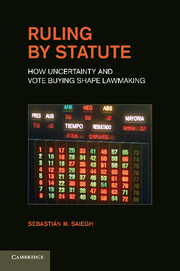Book contents
- Frontmatter
- Contents
- List of Figures
- List of Tables
- Acknowledgments
- PART I INTRODUCTION
- PART II THEORETICAL FOUNDATIONS
- 2 On Statutory Policy Making
- 3 A Model of Statutory Policy Making under Uncertainty
- PART III EMPIRICAL IMPLICATIONS
- PART IV NORMATIVE IMPLICATIONS
- PART V CONCLUSIONS
- PART VI APPENDICES
- Bibliography
- Index
2 - On Statutory Policy Making
Published online by Cambridge University Press: 03 May 2011
- Frontmatter
- Contents
- List of Figures
- List of Tables
- Acknowledgments
- PART I INTRODUCTION
- PART II THEORETICAL FOUNDATIONS
- 2 On Statutory Policy Making
- 3 A Model of Statutory Policy Making under Uncertainty
- PART III EMPIRICAL IMPLICATIONS
- PART IV NORMATIVE IMPLICATIONS
- PART V CONCLUSIONS
- PART VI APPENDICES
- Bibliography
- Index
Summary
Scholars of comparative politics have traditionally argued that chief executives, both under presidentialism and parliamentarism, require adequate partisan support in the legislature to govern as well as to survive in office. Consider the case of Argentina's Fernando de la Rúa. The fate of his presidency was sealed on the night of October 14, 2001. After almost two years in power, his administration lost control of the two Houses of Congress to the Peronist party. Two months later, on December 19, 2001, thousands of people marched on the Casa Rosada calling for his resignation. After de la Rua stepped down, Adolfo Rodríguez Saá became interim president. But he also had to resign a week later when he lost the support of fellow Peronist governors. A Peronist-controlled Congress eventually chose Eduardo Duhalde to complete De la Rúa's term. These events show the degree to which a chief executive with little legislative support can unleash a dangerous spiral that renders a country increasingly ungovernable.
Chief executives whose parties do not control the legislature are common in all countries. Still, it is not always the case that these chief executives are doomed to failure. Moreover, even chief executives with considerable partisan support in the legislature and significant agenda-setting powers may find it difficult to muster sufficient votes in the legislature and obtain passage of each and every one of their proposals. Peru's Alberto Fujimori is a case in point.
- Type
- Chapter
- Information
- Ruling by StatuteHow Uncertainty and Vote Buying Shape Lawmaking, pp. 17 - 35Publisher: Cambridge University PressPrint publication year: 2011



